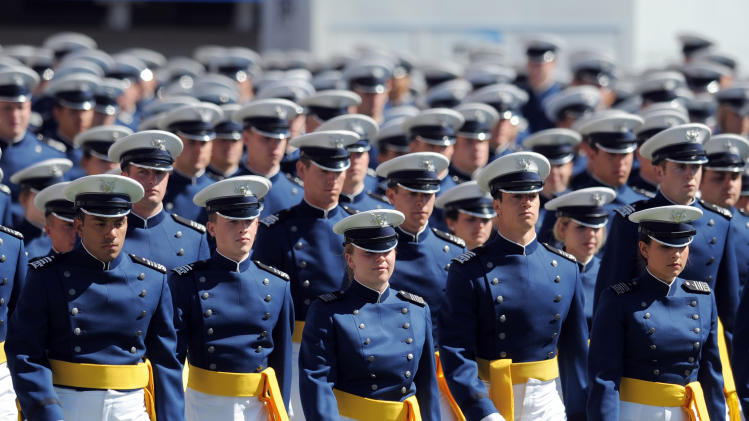Atheist must swear to God -- or leave US Air Force
Air Force Academy Cadets walk
onto the field at the start of the graduation ceremony for the US Air
Force Academy at Falcon Stadium on May 23, 2012 in Colorado Springs,
Colorado (AFP Photo/Chris Schneider)
Washington (AFP) - The
US Air Force has told a sergeant he will have to leave the military
unless he agrees to take an oath with the phrase "so help me God,"
officials said Tuesday.
In the latest
religious controversy to roil the air force, the atheist airman last
month was denied his request to re-enlist because of his refusal to
swear to God -- and he is now poised to take the military to court, his
lawyer said.
"We have not received word from the Air Force
regarding our letter. It has not indicated a willingness to settle out
of court," said Monica Miller, an attorney for the American Humanist
Association, which has taken up the service member's case.With the deadline for re-enlisting expiring in November, the technical sergeant at Creech Air Force base in Nevada -- whose name has not been released -- will be forced to sue the government in a federal court, Miller told AFP.
In the past, an airman could opt for an alternative phrase and omit the words "so help me God," but the US Air Force changed its policy in October 2013.
The other branches of the American military do not require the reference to God and make the phrase optional.
"This
is the only branch to my knowledge that's actually requiring everyone
in all instances to use the religious language," Miller said.The requirement violates the US Constitution, which bars religious tests to hold office or other positions, Miller said of the case, which was first reported by the Air Force Times.
"The government cannot compel a nonbeliever to take an oath that affirms the existence of a supreme being," she said.
The
sergeant's service expires in November and he has until then to
re-enlist and take the oath, said US Air Force spokeswoman Ann Stefanek.
In the meantime, "a written legal opinion is being requested" from the Pentagon's top lawyer, she said.
The air force has been plagued by controversy for years over religion and the role of Christian evangelists.
The
US Air Force Academy in Colorado faced accusations several years ago
that evangelical Christians exerted a dominating influence over the
institution.
But attempts to
counter the perceived bias in the service have sparked criticism from
Christian activist groups, who allege a new rule stifles the religious
expression of troops.
The disputed rule bars commanders from promoting their religious convictions to their subordinates.
Advocates
of the policy say it protects troops who worry their careers could be
jeopardized if they do not take part in their superior's Christian
activities.



No comments:
Post a Comment